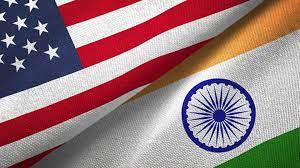If something is constant about global affairs, it is change. In this everchanging, dynamic world of complex relations, nations keep coming together or collaborate for their national interests. This collaboration cannot and should not be considered as permanent.
National priorities, interests, bilateral dynamics, multilateral platforms keep changing according, if something remains constant, it is the urge for power. Every nation, every leader wants power. Power has multi-dimensional aspects and it too plays a critical role in making or breaking relations among the nations. This week shown us the power-play among various stakeholders of the global politics. On one hand, India-US relationship reached to the new heights of engagement, on the other hand, Wagner group created a critical crisis for Putin in Russia. Meanwhile China remained subtle, but US opened a new chapter of rivalry with it by announcing its new deal with Taiwan.
India-US Partnership: A Challenge to China’s Ambitions
India-US relations indeed seem to be in an unsurpassed form presently. After completion of the much awaited ‘state visit’ by Indian Prime Minister, both the nations have come up with incredible announcements in the key areas of security and defence, economy, education, science and technology etc. Both the leaders of India and the US, Prime Minister Modi and President Biden, have reinstated their commitment to promote policies for creating a suitable environment for greater technology sharing, co-development, and co-production between Indian and American government, industry, academic institutions and entrepreneurs. With this, India will be able to scale new hights of development. On the other hand, the US will enjoy the trusted partnership of India. This certainly will raise eyebrows of few nations such as China. China has been trying relentlessly to establish its hegemony in the world. It does not have good relations with both the US as well as India, and this new chapter in the India-US relationship will be a challenge for China.
US Arms Sale to Taiwan Escalates Tensions, Raises Doubts on US-China Relations
It .seems that challenges are continuously snowballing for China. Apart from trying its best to assert its control in the Indo-Pacific, China is also trying its best to manage Taiwan. Taiwan, or the Republic of China (ROC), separated from China (the communist People’s Republic of China) by the Taiwan Strait in 1949. Since then, Chinese governmenthas not left any stone unturned to‘unify’(?) this separated island with PRC. Taiwan enjoys democracy and does not want to be a part of Mao’s communist nation. But China considers Taiwan as a part of its territory. China continuously keeps Taiwan engaged in different tussles, and Taiwan takes help from the US and other Western bloc nations to defend itself. This week, The US has announced to sell ammunition of worth USD 440 million to Taiwan. The US officials announced this as an effort to boost Taiwan’s defence against China. This significant announcement has not only invited sharp reaction from China, it has also raised a big question mark on the future of US-China relations. After Blinken’s recent visit to China, both the nations had expressed their optimism towards normalizing their bilateral relations. Both Biden and Xi will be meeting in the upcoming G-20 summit in India. However, for now, normalization of relations between the US and China looks like a far-fetched dream. It would be interesting to see what unfolds next for the US-China relations.
Putin’s Ally Accuses Russian Forces, Crisis Erupts
Amid Russia-Ukraine war, another unimagined drama unfolded on the home-turf of Putin.Yevgeny Prigozhin, the founder of the Wagner Group, a Russian private army, and a very close ally of Putin, accused the Russian forces of attacking his forces in Ukraine. He then announced a‘march for justice’ to stop the injustice of the Russian military and leadership. Baffled by this attack from his closest ally, Putin ordered his state security agency, the F.S.B. (the state security agency) to start a criminal investigation against Prigozhin for betraying Russia andinitiating an armed rebellion. Just in next couple of hours, Wagner units took control of Rostov-on-Don, a city in Southern Russia and the military headquarters of war in Ukraine. While this was going on, Prigozhin remained inside hismilitary base. From there, Wagner units claimed to take control of Voronezh, a city three hundred miles from Moscow. It looked like a serious crisis for Putin and many news channels even reported that Putin had fled from Moscow. But the tension de-escalated after the intervention of Belarusian President Lukashenko who mediated an agreement between Prigozhin and Putin. After this intervention, Putin agreed to drop all criminal charges against Prigozhin. He was provided a safe passage to Belarus. On the other hand, Wagner units halted their march towards Moscow and turned around. Although the political crisis may end but this drama is certainly going to impact Russia’s position in its war with Ukraine. Wagner group has been fighting the war on behalf of Russia at various strategic locations in Ukraine and proved to be a big support for Putin in the war so far. Prigozhin’s exit from the good books of Putin will certainly impact Russian forces deployed in Ukraine.
This shows the true face of world politics. Despite all calculations and estimates, it remains unpredicted just like the human beings themselves who stand at the grass-root level of world politics. Their interests, priorities and objectives shape the global affairs, and vice versa. This interesting cycle is eternal, intricate and dynamic.
The author is Professor, School of International Studies, JNU.







